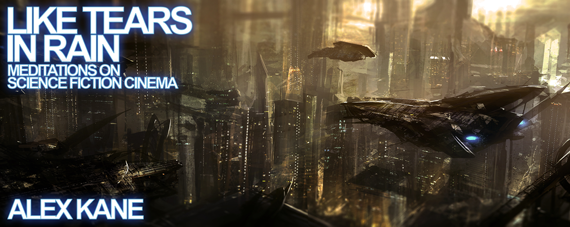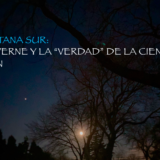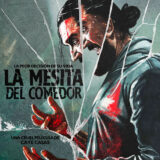
[youtube https://www.youtube.com/watch?v=J_hYs1jBy8Y&w=570&h=321]
You can almost smell the rain, feel it hammer the leather of your trenchcoat. Hear the harmonic buzz of blue neon all around you. You can taste the Tsingtao, bubbly and cool on your tongue. If there’s a single flaw worth noting about the Blu-ray transfer of Ridley Scott’s Blade Runner: The Final Cut (’07), it can be only the opening expositional crawl—an almost quaint artifact of its time, given the 2019 date it supplies—which is still quite valuable for its brief explanation of the “replicant” as a genetically engineered, as opposed to mechanical, variety of android.
Blade Runner is a film valued for its stunning visual representation of the future, the relative diversity of its cast despite the quasi-Aryan villain Roy Batty, and the undeniable success of its all too human drama.
But what makes it so timeless, a box-office flop that has been elevated to classic status over the years due to its cult audience, is its unpretentious use of metaphor: The replicant serves as a mirror for the countless ways in which humanity draws arbitrary divisions among its members, and the horrific conditions those who are labeled as subhuman, or as “the other,” are subjected to through various political machinations.
It’s only shocking if you choose to ignore our history.
For example, Rick Deckard (Harrison Ford) is a twenty-first century bounty hunter—an officer of the law contracted to hunt and kill rogue “skin jobs” in the golden age of exocolonization. He appears reluctant in the film’s beginning to return to his role as the titular blade runner, having previously quit the force; the expression on Ford’s face as he is briefed on the Nexus-6 synthetics running loose in Scott’s future Los Angeles shows the inner turmoil he faces each time this sort of work comes his way.
His investigation leads him to the headquarters of the all-important Tyrell Corporation, where he’s greeted by the first of the film’s true stars: the replicant Rachael (portrayed by newcomer Sean Young, who is mesmerizing beyond reason in the role)—a Nexus-7, most likely, designed to be virtually indistinguishable from her human counterparts; and the first of her kind to go largely undetected by the Voight-Kampff test, which is intended to scope out telltale signs related to human empathy, or a lack thereof.
Her unique situation, however, is compounded by her creator’s having kept her replicant status a secret; due to false memory implantation, and basic ignorance regarding her origin, she manages to answer “well over a hundred” empathy-related questions without Deckard at last reaching a conclusion as to whether she’s human. . . .
She is, for the audience, a symbol of the superficiality which divides one human being from the next—and one of many clues that seem to suggest Deckard himself may be a replicant, given how little we’re told about his past.
And setting aside the romantic subplot—and the fact that they end up together, their uncertain fates entwined in the end—the scene in which Rick Deckard reveals to Rachael what she really is, that she’s a living, organic work of human artifice, with few memories or experiences to truly call her own, is a testament to Scott’s brilliance as a director. The brief exchange highlights, I’d argue, just how truly perfect Sean Young is for playing the part of a replicant ripped from the safety of her genetic cradle and told face-to-face what she is.
When Deckard sees how hurt she is by the revelation, he tries to take back his words, to tell her it was all a terrible joke. But her innocence is lost in light of the man’s knowledge. He pours a drink, and they make love, all to an incredibly beautiful and spacious piano track by Vangelis.
In a later scene, Deckard examines photographic evidence while sitting near his own piano—sheet music laid out in front of him—and daydreams of a white unicorn. A symbol that comes back to haunt him when, left as a calling card by Detective Gaff (Edward James Olmos), Deckard discovers that the mythic animal in his dream is perhaps a programmed archetype not unlike the content of Rachael’s implanted memories.
But it is Rutger Hauer’s unforgettable performance as the fierce and relentless Roy Batty, whose ruminations on mortality and the ephemerality of time and human experience serve as the film’s thematic backbone, which represents the film’s true gift to the realm of science fiction cinema.
“If only you could see what I’ve seen with your eyes,” he muses, while trying to extract information about the Tyrell Corporation and its leader from a man who specializes in the engineering of cultured eyeballs.
Much of the conflict driving the film’s intricate plot stems from the widespread sale and manufacture of genetically-engineered, “artificial” creatures, from snakes to owls to the humanoid Nexus-model replicants. Creations tell of an implicit creator, and Scott seems in this film, as with his more recent effort Prometheus (’12), to make the intelligent-design argument for God’s existence: Close examination of organic tissue reveals serial numbers beneath a microscope’s lens; android dreams act as windows into the Jungian interconnectedness of creation and the decidedly social human mind. The film presents again and again the dilemma of those seeking in vain for their divine creator, only to find that true divinity is more often found in the mortal subjects of such a cosmic being’s creation.
Batty himself is a servant of the undeniable beauty to be found in every passing moment, and the uniquely subjective nature of experience. He seems to reflect throughout the film on the tragic nature of both consciousness and memory as fleeting, intangible impressions. He’d no doubt prefer the preservation of his experiences through the relative permanence of, say, art—or even a technology such as the internet—over the simple act of dying and being ultimately forgotten.
His search for the key to extending his lifespan, limited by his maker to a mere four years, acts as a constant symbol for the cruel truth of our own impermanence, the finitude of our existence.
One can’t help but feel for him, and share his pain, even as we strive to comprehend Deckard’s.
As malevolent as the script forces Batty to become in both his inner anguish and violent methodology, we see our own basic fears and insecurities reflected back at us: the basic undesirability of death despite its inevitability, the harshness of a life spent in servitude, and what is often perceived to be the futility of revolution against the injustice of the ruling class.
“It’s not an easy thing to meet your maker,” he tells his father-figure creator, Dr. Eldon Tyrell—who replies, “What seems to be the problem?”
“Death,” Roy Batty explains.
His irreverence toward Tyrell also seems to suggest that while death comes to everyone at one point or another, there is a certain moral failure in coming face to face with God (figurative or literal) and demanding His mercy—in demanding for the ageless but elusive gift of immortality. And Batty, much like the pioneering corporate investor Peter Weyland of Scott’s Prometheus, finds that such demands are ultimately fruitless. That, like the biblical Job, a mortal man can find comfort and peace only in the acceptance of his own mortality—and God’s intentions, if indeed there is a god at all, are neither to be known nor questioned.
Blade Runner, then, is most successful as an allegory of human beings divided by false social stratifications but united in their universal struggle with the sheer finitude of life. Just as moments glimpsed in the great river of time are invariably washed away—“like tears in rain,” as Batty puts it in the famous monologue that ties the film together near its completion—so, too, are human lives transient and finite.
In the end, there’s no sensible way to put a value on one person’s experiences, thoughts, or desires as being greater or lesser than those of anyone else in this world. We are all droplets in the same rushing waterfall, inextricably bonded together; birthed and ended from the same great stream of existence: identical, imperfect, dissatisfied. And perhaps a great deal more divine in our quiet moments of desperation, in our constant searching and questioning of the cosmos, than any architect, artist, or cameraman could ever be.










